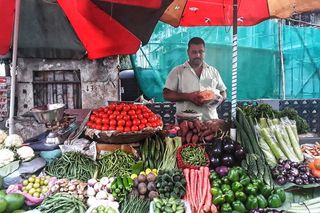
Peripheral Vision: a Vegetable Vendor
“At times, I myself can’t afford to buy vegetables because they are that expensive.”

Our series, Peripheral Vision, explores the untold stories of people we encounter on a daily basis.
My name is Shatrughan Singh, and I’m 37. Currently, I’m taking care of my brother’s vegetable stall because he’s gone to Uttar Pradesh to visit our family. I also do the same thing for a living — sell vegetables — and my own shop is close to where I live in Borivali.
Back home, the whole family is into farming. We have a small farm where we grow most of the vegetables, both for our own consumption and to sell. But with the amount of money we make from doing that, it’s not enough to sustain a family of 12.
So, 10 years ago, my brother and I decided to shift to Mumbai, without any aim in mind or job in hand, with just one thought: the city has jobs to offer to one and all, so we’ll also find something to do.
We’ve both studied only till Grade 10, so we weren’t expecting great jobs but were ready to do anything that came our way — drivers, auto drivers, petrol pump operators, just anything that paid enough.
When we came here, we lived out of a train platform. Slept on the benches and used the public toilets for several days. Every morning, after eating a vada pav, we would set out to talk to shopkeepers, asking if they had vacancies. After a few attempts, I was employed as a salesman in a small shop that sold utensils, and my brother was employed in another one that sold clothes.
In a couple of days of working at our respective jobs, we managed to find a small chawl to live in, too. We set it up slowly and kept working for a couple of months until someone told us of his vegetable-selling business. We had some experience with vegetables, so we got inspired by this man’s experience and thought of the same business idea. We’d saved some money from our jobs, and we invested that for procuring whatever we needed to get a vegetable-selling business going.
Related on The Swaddle:
Peripheral Vision: a Bar Housekeeper
Creating your space among other hawkers isn’t easy. They’re extremely territorial about their place and possessive about their customers. Even though the other vendors hailed from the same village as ours, they were quite unaccommodating of us. A city like this does make people competitive. In the beginning, we set up a little stall close to where we lived, but we had no visibility. We were hardly making money. So, we set out to look for bigger spaces and ways to procure a variety of vegetables. Some vendors who were kind enough to help told us about the Dadar bazaar where vegetables from all over the state come early in the morning, a center-point for all vendors to buy vegetables from and sell all over the city. We also applied for a BMC license and got one pretty quick. Slowly, all our systems were getting in place.
Our first stall was near a residential colony, so people would keep pouring in all day long. Although we had a farming background and were familiar with different kinds of vegetables, it was only after we sold it in this city that we got to know about broccoli, lettuce, celery, baby corn, and that bell peppers were available in different colors. We were so fascinated with it that we clicked pictures of them to show to our folks back home.
We were getting into the groove of the business, waking up at 4 a.m. every morning to reach the Dadar market, setting up the stall by 8 a.m., starting the business with a small pooja, and dealing with customers all day. We made some loyal ones, too — a 68-year-old customer being our favorite one. A retired professor would come to buy vegetables every day, chat with us over a cup of chai, and leave. On Diwali and Holi, he would give us sweets and some money; once he even bought us new shirts. When he passed away, we shut our stall for a day as a mark of respect.
After my brother got married and got his family here, he moved out of the house, from Borivali to Andheri. He said instead of traveling every day to Borivali, he’d rather set up a new one in Andheri. And slowly, he did. Today, we have two stalls. I won’t say it’s a lot of money, but it is satisfying. It doesn’t make us miss home too much. Our phone conversations with people back home are also all about vegetables — we compare the price, quality, availability. I’ve educated them about the techniques I’ve learned here to become a good businessman so they can do the same and not make losses.
But I do miss the quality of vegetables we get in the villages — they are fresh, especially in the winters, and grown without any pesticides so they taste much better. It’s funny that despite owning a vegetable business, I don’t know how to cook them, and sometimes, I can’t even afford them. It’s been so many days that I’ve used onion at home, with the price they are at right now; I can only buy them to sell, not eat myself.
This interview has been condensed and edited for clarity. As told to Anubhuti Matta.
Anubhuti Matta is an associate editor with The Swaddle. When not at work, she's busy pursuing kathak, reading books on and by women in the Middle East or making dresses out of Indian prints.
Related


Respectfully Disagree: Should Rape and Sexual Violence Be Portrayed in Film and on TV?
